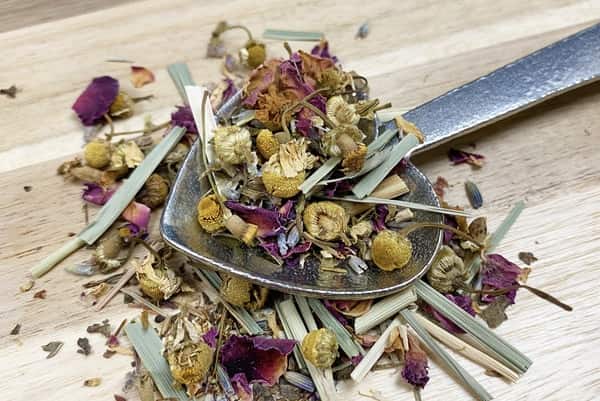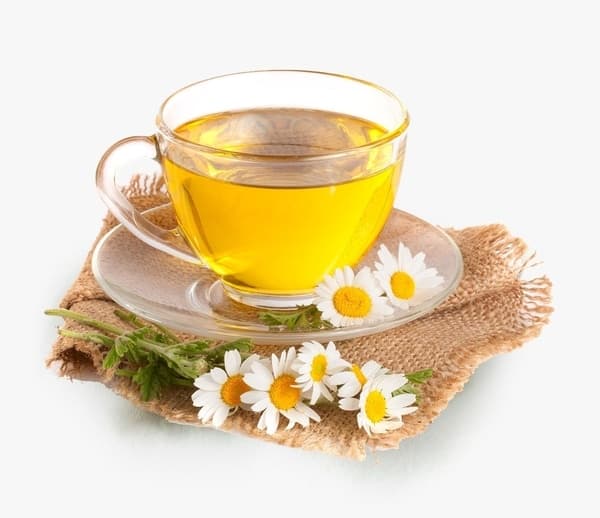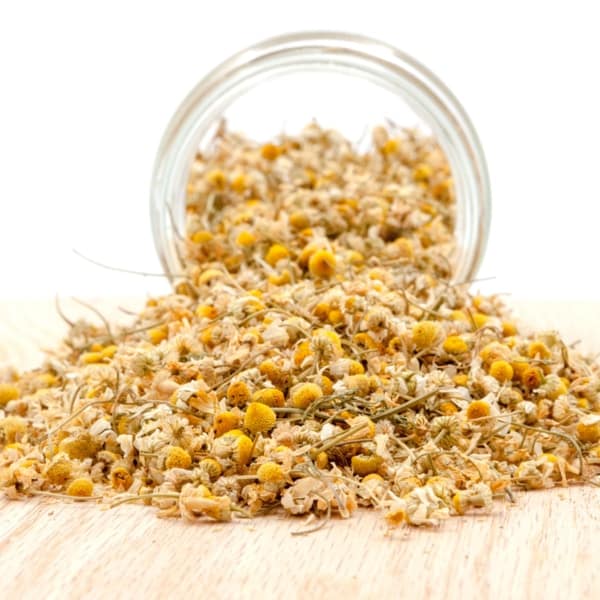Chamomile is a herb that has been used for centuries for its medicinal and health benefits. Among the herbal teas, chamomile tea is the most popular tisane all over the world. In this article we will try answering the below questions:
- What is Chamomile Tea?
- History of Chamomile Tea?
- Nutritional Value of Chamomile Tea?
- Taste of Chamomile Tea?
- Health Benefits of Chamomile Tea?
- Side-Effects of Chamomile Tea?
- Interactions of Chamomile Tea?
- Usage of Chamomile Tea During Pregnancy?
- Is it safe to use chamomile tea for babies?
What is Chamomile Tea?
Chamomile Flowers are derived from the Asteraceae family of plants and are used for various herbal and healing remedies. The chamomile tea is derived from these chamomile flowers and is made using the infusion of flower petals and hot water. The Spanish name of Chamomile tea is manzanilla tea. Chamomile has been used in a wide range of purposes from skincare products. (Chamomile Tea Benefits, Cup And Leaf, Retrieved on 1 January 2023) It is mostly grown in parts of Asia, Europe, North America, and Australia during the summers. It is also used to prepare Chamomile green tea.

Chamomile Tea taste, Lily Cooper, Plum Deluxe, Google Images, licensed under CC BY 2.0
History of Chamomile Tea
The usage of Chamomile tea dates back to Ancient Egypt where it was used for cosmetic, fever and religious purposes. Romans used this magical herb to add flavour to their beverages and as a herb to cure many ailments. During medieval times, Chamomile was used to add an aromatic scent to public events by sprinkling the fresh chamomile flowers. Some people say chamomile was also used in beer production to add a new flavour (Chamomile Tea Benefits, Cup And Leaf, Retrieved on 1 January 2023).
How many calories and vitamins are present in chamomile tea?
According to the U.S Department of Agriculture, chamomile tea is very low in calories if taken in the classic form. Although it is not a significant source of many nutrients as such, it is listed as a healthy beverage (Reference - Chamomile Tea - Benefits and side effects, Everyday Health, Retrieved on 1 January 2023). A single cup of chamomile tea contains 2 calories and 0.5 grams of carbohydrates. Below is the list of nutritional facts of chamomile tea per 100 grams:
- Calories - 1 kcal
- Sodium - 1 mg
- Potassium - 9 mg
- Vitamins A - 2 mg
- Calcium - 0.08 mg
In addition to the above, Chamomile tea also contains magnesium, fluoride, and folate. (Reference - Benefits of Chamomile Tea and its side effects, Lybrate, Retrieved on 1 January 2023) Chamomile tea including Chamomile green tea is rich in flavonoids that have antioxidant and anti-microbial properties
What is the Taste of Chamomile Tea?
Chamomile Tea’s flavour has herbal and fruity notes with a very refreshing smoothness in each sip. Its taste is quite similar to crisp apple and that’s from where the word chamomile is derived from. The chamomile tea has a very light, airy taste with a sweet aromatic scent which is universally accepted. Chamomile tea is quite light when brewed with a yellow tinge colour invoking the notions of soft sunlight for a healthy mind and body benefits. (Chamomile Tea Benefits, Cup And Leaf, Retrieved on 1 January 2023).

रोजाना कैमोमाइल टी पीने के फायदे, Isha Tyagi, Lifealth, Google Images, licensed under CC BY 2.0
What are the Health Benefits of Chamomile Tea?
1. Helps Boost immunity
Due to the presence of anti-inflammatory and anti-oxidants properties of Manzanilla tea, it not only cures many illnesses but also helps prevents to a great extent. It helps fight harmful bacteria and has the ability to boost immunity (Reference - 13 incredible benefits of drinking Chamomile Tea, NDTV food, Retrieved on 1 January 2023)
2. Improves sleep quality
One recent study found that chamomile tea reduce insomnia in a sample of 40 postpartum women and the effects stopped when they stopped drinking the magical tea. Chamomile tea contains a flavonoid called apigenin, which binds to the receptors in our brain cells giving a sedative effect. Though this would be very tempting to drink chamomile tea during pregnancy to get sound sleep, it is advisable to consult the doctor before taking it. Mothers make Chamomile tea for babies as a safe and natural sedative.
3. Helps to regulate Diabetes
Chamomile tea is quite beneficial for people suffering from type 2 diabetes. According to a study, 32 patients were advised to drink chamomile tea 3 times a day for straight eight weeks. The result was lower insulin and cholesterol levels as compared to the other group which drank plain water. So diabetes patients can make chamomile tea as part of their lunch and bedtime routine (Reference - Chamomile Tea - Benefits, Well and Good, Retrieved on 1 January 2023)
4. Reduce Skin Acne and Dark Circles
Chamomile Tea is full of antioxidants that fight the free radicals and thus reduce the acne and other skin bacterial infections. Having Chamomile tea twice a day nourishes and hydrates the skin to keep it healthy from deep within. Many beauticians use chamomile tea extracts in home-made beauty recipes for glowing skin.
5. Reduce Heart Disease Risk
With the increasing lifestyle changes and poor diet choices, there is an increased risk of heart disease. Chamomile tea can help to keep the heart-healthy. There are many studies which have shown that chamomile tea can help lower the bad cholesterol known as LDL cholesterol
6. Relieve Menstrual Cramps
The compounds found in chamomile tea have glycine which helps relax the nerves and reduces menstrual cramps. The glycine compound has antispasmodic properties that help reduce muscle spasms (Reference - 25 benefits for Chamomile Tea for Skin and Hair, Jarved World, Retrieved on 1 January 2023)
7. Helps in Cancer Prevention
The compounds in chamomile Tea have tumour-inhibiting properties for specific cancers like skin, prostate, breast and ovarian cancers. In addition, chamomile tea also helps improve the quality of life of cancer patients. Usage of chamomile tea in aromatherapy can reduce anxiety and stress in cancer patients. (Reference - 7 benefits of drinking Chamomile Tea, Bistro MD, Retrieved on 1 January 2023)
8. Helps in Wound Healing
With the anti-inflammatory compounds, chamomile flower is a packed source of healing powers. The dried chamomile powder acts as a vulnerary agent for wounds, bruises, skin eruptions haemorrhoids (Reference - Health Benefits of Chamomile, Style Crazy, Retrieved on 1 January 2023)
9. Promotes Digestive Health
Chamomile tea helps resolve digestive health problems such as abdominal pain, upset stomach, and irritable bowel syndrome. Manzanilla tea also helps in relieving gas and prevents stomach ulcers (Reference - The Benefits of Chamomile, Very Well Health, Retrieved on 1 January 2023).
10. Alleviate Stress and Anxiety
Chamomile tea has meaningful benefits when it comes to anxiety. As per the Natural Medicines Comprehensive Database, which is the rating of natural remedies, it says that chamomile is effective for anxiety. In addition to soothing effects, chamomile tea may also have anti-depressant effects as well.
What are the Side Effects of Chamomile Tea?
Like most herbal teas, chamomile tea also has its own set of side-effects and risks associated with it.
- If one is allergic to daisies, then chamomile is a big NO for them, irrespective of the health benefits it provides.
- If one experiences skins rashes, uneasiness after taking manzanilla tea, then consult with a doctor before taking another cup of the yellow drink
- If you have thin blood, then you should consult the doctor before starting chamomile tea. For pregnant women, this could induce labor or leads to thinning of uterine wall. This is one of the main reasons why it is preferred to avoid chamomile tea during pregnancy.

Organic Chamomile Tea, Kat Garrod, Google Images, licensed under CC BY 2.0
What are the Interactions of Chamomile Tea?
If you are taking any medicines on a regular basis, consult with your doctor before starting on chamomile tea. The compounds present in chamomile tea could interact with the sedatives, aspirin, blood thinners, NSAID pain killers, antiplatelet drugs and some other drugs (Reference - additives guide for Chamomile, WebMD, Retrieved on 1 January 2023)
Should I drink Chamomile Tea During Pregnancy?
Avoid Chamomile Tea during pregnancy as the case with most of the herbal teas. It might interfere with uterine stimulation and might induce pre-term labour. There are only limited pregnancy herbal teas which should be taken during pregnancy and it is always better to consult with the doctor before starting on any variety. Drinking Chamomile Tea during Pregnancy should be limited to maximum one cup if someone is really into chamomile tea. We would still recommend you to consult the doctor for drinking chamomile tea during pregnancy.
Is it safe to use Chamomile Tea for Babies?
Traditional, mothers have been making chamomile tea for babies to give their babies a relaxing sleep. Chamomile tea for babies is a safe and natural sedative. The chamomile tea for babies not only gives a fuss-free sleep but also drastically improves the quality of sleep. Mothers usually make peppermint tea, fennel tea or chamomile tea for babies to help the upset tiny stomach.
Teacurry.com hopes that you thoroughly enjoyed the above research we have tried to put together in terms of chamomile tea. In case of questions or suggestions please let us know in comments below or write to us at tea@teacurry.com and we would be more than happy to assist you.
References & Sources
- Jones, Daniel (2003) [1917], Peter Roach; James Hartmann; Jane Setter (eds.), English Pronouncing Dictionary, Cambridge: Cambridge University Press, ISBN 978-3-12-539683-8
- “Chamomile”. Dictionary.com Unabridged. Random House. Retrieved 29 August 2014.
- “Chamomile” National Center for Complementary and Integrative Health, US National Institutes of Health. September 2016. Retrieved 6 November 2018.
- “Roman chamomile". MedlinePlus, US National Institutes of Health. 16 February 2012. Retrieved 30 August 2014.
- "Chamomile". Drugs.com. 9 October 2018. Retrieved 6 August 2019.
- "Chamomile". Online Etymology Dictionary. 2019.
- "Chamomile lawns". www.rhs.org.uk.
- Chamomile Beer List". RateBeer. Retrieved 28 August 2019.
- Abebe, W. (1 December 2002). "Herbal medication: potential for adverse interactions with analgesic drugs". Journal of Clinical Pharmacy and Therapeutics. 27 (6): 391–401. doi:10.1046/j.1365-2710.2002.00444.x. ISSN 0269-4727. PMID 12472978. S2CID 1828900.
- Singh, Ompal; Khanam, Zakia; Misra, Neelam; Srivastava, Manoj Kumar (2011). "Chamomile (Matricaria chamomilla L.): An overview". Pharmacognosy Reviews. 5 (9): 82–95. doi:10.4103/0973-7847.79103. ISSN 0973-7847. PMC 3210003. PMID 22096322.































2 comments
This article is very beneficial. There is no doubt there are many benefits of chamomile tea you need to be careful about not consuming it in excess. It is known to cause certain side effects such as allergic reactions, vomiting, drowsiness, itchy eye, etc., only if consumed in large quantities. Therefore, it is advisable that you consume it in moderation to enjoy its benefits to the utmost!
I really love chamomile tea. I sleep so relax the night i drink it. I try to have it everyday to have a nice sleept time to